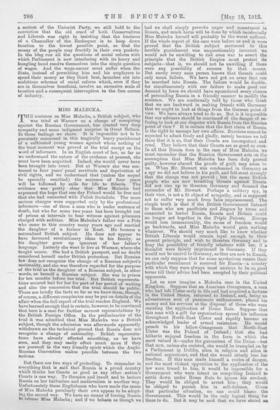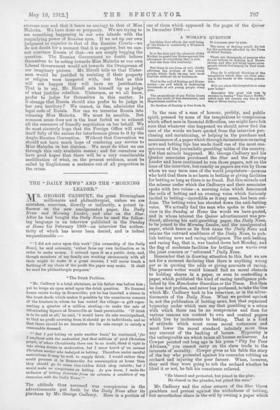MISS MALECKA. T HE sentence on Miss Malcolm, a British subject,
who was tried at Warsaw on a charge of conspiring against the Russian Government, has created very deep sympathy and some indignant surprise in Great Britain. In those feelings we share. It is impossible not to be genuinely concerned in this tragically heavy punishment of a cultivated young woman against whom nothing of the least moment was proved at the trial except on the word of informers. In an English court of law, so far as we understand the nature of the evidence at present, she must have been acquitted. Indeed, she would never have been brought into court. But at Warsaw she was sen- tenced to four years' penal servitude and deprivation of Civil rights, and we understand that (unless the sequel be specially remitted) the sentence of four years will be followed by exile for life to Siberia. The evidence was pretty clear that Miss Malecka had expressed the hope that one day Poland would be free and that she had consorted with Polish Socialists. The more serious charges were supported only by the professional informers—one of them a man who is under sentence of death, but who for some two years has been brought out of prison at intervals to bear witness against prisoners charged with sedition. Miss Malecka's father was a Pole who cattle to this country many years ago and married the daughter of a farmer in Kent. He became a naturalized British subject. He does not appear to have favoured revolutionary ideas in his family, as his daughter grew up ignorant of her father's language. Latterly she went to live at Warsaw, where she taught music. She had a British passport, and no doubt considered herself under British protection. But Russian law does not recognize the change of a Russian subject's nationality, and she was therefore regarded for the purpose of the trial as the daughter of a Russian subject, in other words, as herself a Russian subject. She was in prison for ten months before her trial. But British representa- tions secured bail for her for part of her period of waiting and also the concession that the trial should be public. Those are briefly the facts so far as we know them, though, of course, a different complexion may be put on details of the affair when the full report of the trial reaches England. We have learned enough that is certain, however,to be convinced that here is a case for further earnest representations by the British Foreign Office. In the preliminaries of the trial it was admitted that Miss Malecka was a British subject, though the admission was afterwards apparently withdrawn on the technical ground that Russia does not recognize a change of nationality. British representa- tions have already effected something, as we have seen, and they may easily effect much more if they are pursued in the very friendly spirit which the Anglo- Russian Convention makes possible between the two nations.
But there are two ways of protesting. To remember in everything that is said that Russia is a proud country which thinks her Courts as good as any other nation's Courts is one way. To threaten and insult and to lecture Russia on her barbarism and medievalism is another way. Unfortunately those Englishmen who have made the cause of Miss Malecka peculiarly their own appear to be adopt- ing the second way. We have no means of forcing Russia to release Miss Malecka; and if we behave as though we had we shall simply provoke anger andresentment in Russia, and much harm will be done by which incidentally Miss Malecka herself will probably be the worst sufferer. If the whole report of the case were before us and it were proved that the British subject sentenced to this terrible punishment was unquestionably innocent we would not be unwilling to risk even war to assert the principle that the British Empire must protect its subjects—that is, we should not be unwilling if there wore any possibility of success by that means. But surely every sane person knows that throats could only mean failure. We have not got an army that can be marched into Russia. The failure would be double, for simultaneously with our failure to make good our demand by force we should have squandered every chance of persuading Russia in a friendly manner to modify the sentence. We are continually told by those who think that we are backward in making friends with Germany that we ought to look at things from the German point of view. We have always tried to do so. But is it impossible that our advisers should be convinced of the danger of re- fusing to look at our disputes with Russia from the Russian point of view ? It is certain that the first claim of Russia is the right to manage her own affairs. Russians cannot be expected to admit freely and gladly, merely because we tell them that it is so, that their Courts are incompetent and cruel. They believe that their Courts are as good as ours.
In all that Russia does in the case of Miss Malecka we must remember that the Russian Government acts on the assumption that Miss Malocka has been duly proved guilty, however absurd the proofs of guilt may seem to us. When Mr. Stewart was condemned in Germany as a spy we did not believe in his guilt, and felt most strongly that the charge was not proved ; but the same British people who are now breathing threats against Russia did not rise up to threaten Germany and demand the surrender of Mr. Stewart. Perhaps a military spy, in their view, is not a fit object of sympathy, and is supposed not to suffer very much from false imprisonment. The simple truth is that if the British Government listened to those who are pacificists and Jingoes by turns and consented to hector Russia, Russia and Britain could no longer act together in the Triple Entente, Europe would lose immeasurably, the cause of freedom would go backwards, and Miss Malecka would gain nothing whatever. We should very much like to know whether British Liberals would remain loyal enough to their present principle, and wish to threaten Germany and to deny the possibility of friendly relations with her, if a Socialist were falsely imprisoned in Germany. If they would not be uncivil to Germany, as they are now to Russia, we can only suppose that for some mysterious reason their particular resentment is reserved for Russia—a country with which they were always most anxious to be on good terms till their advice had been accepted by their political opponents.
Let us now imagine a Malcolm case in the United Kingdom. Suppose that an American Orangeman, a man who had left Ulster early in life and had acquired a fortune in the United States, returned to Ireland, and, being an adventurous soul of passionate enthusiasms, placed his money and his services at the disposal of those who were resisting the application of Home Rule. Suppose that this man with a gift for organization spread his influence throughout North-East Ulster and rapidly became an acknowledged leader of armed resistance. He would preach to his fellow-Orangemen that North-East Ulster was the Poland of Ireland ; that she had hitherto enjoyed freedom in the form in which she most valued it—under the guarantees of the Union—but that now, unless she resisted, she would be trampled on by a Parliament in Dublin, alien in religion and alien in national aspirations, and that she would utterly lose her freedom. If this man made himself a centre of danger, and the most violent opposition to the application of the law were traced to him, it would be impossible for a. Government who were intent on compelling Ireland to settle down under Home Rule to ignore his conduct. They would be obliged to arrest him ; they would be obliged to punish him in self-defence. Given that particular situation, no one could blame the Government. This would be the only logical thing for them to do. But it may be said that we have stated an extreme case and that it bears no analogy to that of Miss Malecka. We have done so purposely. We aro trying to see something happening in our own islands with the magnifying power of Russian oyes. If we set up our own judgment as superior to that of the Russian Courts—we do not doubt for a moment that it is superior, but we can- not convince Russia of that—we are simply begging the question. The Russian Government no doubt believe themselves to be acting towards Miss Malecka as our own Liberal Government would act towards the Orangeman of our imaginary picture. Mr. Birrell. tolls us that Ulster- men would be justified in resisting if their property or religion were tampered with, but that as this will not happen they will have no justification. That is to say, Mr. Birrell sets himself up as judge of what justifies rebellion. Ulstermen, as we all know, prefer to judge for themselves in this matter. Is it strange that Russia should also prefer to be judge in her own territory ? We cannot, in fine, administer the legal code of Russia. Nor can we terrorize Russia into releasing Miss Malecka. We must be sensible. But common sense does not in the least forbid us to exhaust all the resources of friendly negotiation on her behalf. We do most sincerely hope that the Foreign Office will avail itself fully of the excuse for interference given to it by the Anglo-Russian Convention. Without that Convention we should not have much hope of rendering any service to Miss Malecka in her distress. We must do what we can through this only available means ; and for ourselves we have good hopes that there will be a very considerable modification of what, on the present evidence, must be called by Englishmen a sentence out of all proportion to the crime.











































 Previous page
Previous page